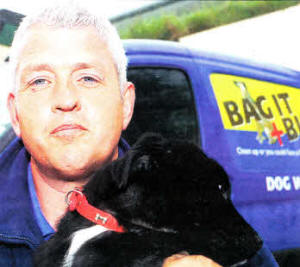
Jenny Monroe talks to Ian McCreary
 IAN
McCreary, 43, is senior dog warden for Lisburn City Council. He has always
been passionate about animals and says this stems back to his family's
farming background. Ian previously worked for the USPCA and Battersea Dogs
Home. He is keen to promote responsible dog ownership in the area.
IAN
McCreary, 43, is senior dog warden for Lisburn City Council. He has always
been passionate about animals and says this stems back to his family's
farming background. Ian previously worked for the USPCA and Battersea Dogs
Home. He is keen to promote responsible dog ownership in the area.
I start work at 8am in the Council's Dog Kennels at Altona Industrial Estate. The first thing I do is check all the dogs are ok. I sort out the kennels making sure they are clean and tidy and then go to the main office and see what calls have to be responded to and lift a list of concerns which have come from members of the public and allocate them to the other wardens and myself. People may have been in touch to report a missing/found dog, dog attacks, sheep worrying or fouling.
Lisburn faces a huge problem with stray and unwanted dogs roaming its streets. Many dogs end up dumped on the streets or in the Council's kennels because they are bought as presents for people who are not fully committed dog owners; parents buy their children a puppy but the child soon loses interest and the parents do not want the responsibility for looking after it. Some owners believe the dog has developed incurable behaviour problems, however in reality most behavioural problems can be overcome.
Other situations we deal with are dogs which are not fitted with any means of identification so they cannot be traced back to their owners; and dogs are not neutered which leads to unwanted puppies, which are then abandoned.
If I find a stray dog I try and identify its owner. If the dog is microchipped or wearing an identity tag, this is not a problem, but unfortunately most dogs picked up by the Council do not have a means of identification.
We take dogs without any means of identification and those dogs that can be identified are returned to their owners. I write up a report and this will be placed on our data base. I can issue a fixed penalty to owners who continually allow their dog to stray. Mistakes can be made but we are strict with regular offenders. Dogs stay with us for five days and we take names of anyone interested in re-homing them. The public can come to the kennels to see if there is a dog they would like to re-home. If, after the five days, nobody has offered to take a dog we contact local animal charities. Only on rare occasion is an animal destroyed. The Council for a limited time will be offering free microchipping for any dogs that are re-homed from the Council's Dog Kennels.
The Council is very keen to re-home any stray/unwanted dogs that remain in its kennels for five days. By working in partnership with local animal charities we ensure the majority of dogs find a new loving home.
Dog fouling is a another problem in the area. Like any crime, dog fouling is punishable. If detected allowing your dog to defecate without cleaning up the owner (or the person in charge of the dog at the time) may face an on-the-spot fine of £50. Lisburn City Council is very aware of the problems this anti-social behaviour brings and is keen to deter offenders.
To this end a number of measures have been put in place to promote a more
responsible attitude towards dog ownership and apprehend those who
continually act in an irresponsible manner.
At the end of my shift I make sure the animals are warm or cool enough
depending on the weather and I file away all the paperwork.
Ulster Star
18/06/2010
